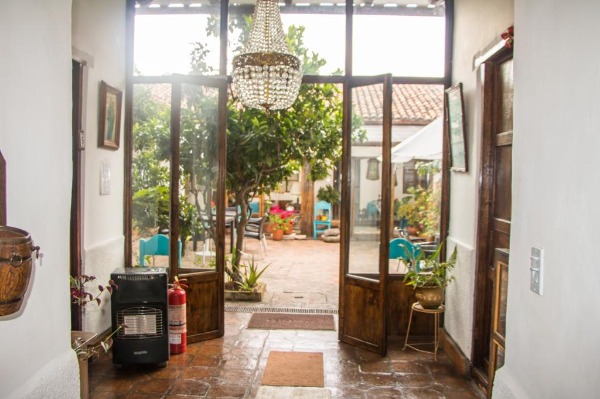New Cuenca immigration office promises expats personal service, faster turn-arounds without legal expenses
Life just got easier for Cuenca's English-speaking foreigners.
According to its director, Ana Lucía Serrano, Cuenca's new immigration office means that foreigners will no longer need to travel to Quito to conduct their visa business. It also means shorter application turn-around times and that applicants can navigate the process on their own, working with English-speaking office staff, without the paid assistance of attorneys.

Serrano, who is also Regional Coordinator for the Ministry of External Affairs, Commerce and Integration, says that the Cuenca operation, which opened June 4, is a pilot project aimed at streamlining immigration services for foreigners. If the local office is successful, its procedures may be adopted nationwide.
“When Ricardo Patiño, Ecuador's Minister of the Exterior, asked how we could improve the system, I suggested that we open an office in Cuenca,” says Serrano. “We have more foreigners here, especially from North America, than in any other part of the country. We need to put the service where the need is.”
According to Serrano, the Quito-based immigration office has been plagued for years by inefficiency. “There has been a great deal of staff turn-over and it has meant that processing applications often took many months. There was also a lack of consistency in how the applications were evaluated.”
Frustration with the old system was felt at the top of the government, Serrano says. Three months ago, President Rafael Correa moved immigration operations from the Ministry of the Interior to the Ministry of the Exterior. Patiño, one of Correa's most trusted cabinet ministers, heads the exterior ministry. “The president knew that changes had to be made and he fully supports what we are doing in Cuenca.”
One reason for the change, says Serrano, was to bring immigration operation into conformance with Ecuador's 2008 constitution, which promises fair treatment for foreigners and immigrants. “In Ecuador, there is no such thing as an illegal immigrant,” she says. “A person cannot be illegal and everyone is guaranteed the right to be treated fairly.” Her office uses the term “irregular” to describe foreigners who do not comply with visa rules.
The Cuenca office handles both non-immigrant visas, such as those for students, teachers and tourists, as well as immigrant, or residency, visas. In addition, the office serves the area's sizeable Peruvian and Colombian populations, other foreign nationals, and provides passport service to Ecuadorians.
Serrano cautions that the new efficiency also means a more thorough review of visa applications. “There were some irregularities and loopholes in the past and we are eliminating these,” she says.
For example, she says some students and teachers were issued visas for schools that were not certified by the government. In another case, applicants were granted work visas based on corporations that had no function other than to support visas. She also cited the fact that some 9-II, or investor, visas were backed by funds deposited in cooperatives or other non-traditional financial institutions, instead of in banks chartered by the government, and said this will no longer be allowed.
“We will be checking applicatio ns very carefully. We will be fair but we will be strict.”
ns very carefully. We will be fair but we will be strict.”
Serrano emphasizes that most old rules still apply. Visa applicants must bring properly legalized documents, such as police reports and income statements, from their home countries. “Applicants need to understand their responsibilities before they come to Ecuador. Our office is here to provide information and advice.”
If documents are in order, says Serrano, her office will process visa applications promptly. In the case of residency applications, her goal is a 60-day turn-around. The adds that applications that have been submitted to the Quito office, must be completed in Quito.
Serrano, who went to college in Vancouver, Canada, and who has traveled extensively, says she understands the challenges that foreigners face. “This is why I want to make this office a place you can get the information and assistance you need, in your own language.”
She explains that the visa process should not require lawyers or legal assistants. “Some people have spent thousands of dollars in legal fees to get their visas, mostly because the system was inefficient and because there was no one who spoke the applicant's language.” Serrano says some applicants may still prefer to have some one assist them, but it is a personal decision. “Applicants need to know, for example, that they can get a residency visa for $350 and don´t need to pay more.”
The emphasis on North Americans is based on the numbers, says Serrano. “We estimate that there are 4,000 North Americans in Cuenca,” she says, adding that the total includes those on short-term, non-immigrant visas, as well as residents. In response, her office has established a special “expat” service to handle the issues of English-speaking foreigners. The email address is expats@mmrree.gob.ec.
Other sizeable foreign populations in Cuenca include Peruvians (1,300), Colombians (1,000) and French (200).
“We are here to serve our clients and to do it in a friendly, efficient way,” says Serrano. “Foreign residents already have enough problems to deal with, adjusting to a new country and new language. We do not want to be another problem for them.”
For general information about immigration and visa issues, go to www.mmrree.gob.ec/servicios/indice.asp.
The Cuenca immigration office is open from 8:00 a.m. to 4:30 p.m. weekdays, and is located on the ground floor of Edificio Astudillo, Av. Ordoñez Lasso at Guayacán, tel. 285 0085 or 285 0086; email aserrano@mmrree.gob.ec.
Credit: Reposted from the Miami Herald International Edition, July 3, 2012, http://www.todayinecuador.com; Photo captions: The help desk at the new immigration office; Director Ana Lucia Serrano; Edificio Astudillo on Av. Lazo in Cuenca.





















